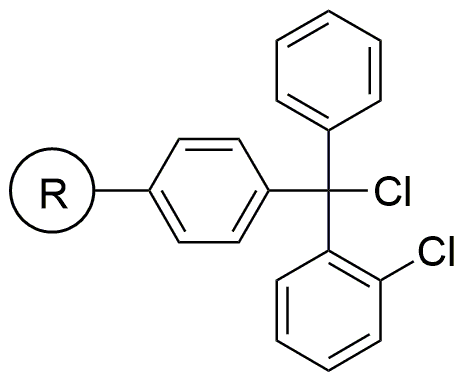2-Chlorotrityl chloride resin is widely utilized in research focused on various applications:
- Solid-Phase Peptide Synthesis: This resin serves as a solid support for synthesizing peptides, allowing for efficient coupling of amino acids and easy cleavage of the final product.
- Drug Discovery: It is used in combinatorial chemistry to create diverse libraries of compounds, facilitating the identification of potential drug candidates.
- Bioconjugation: The resin can be employed to attach biomolecules, such as proteins or nucleic acids, to solid supports for various biochemical assays and studies.
- Environmental Applications: It is utilized in the extraction and purification of environmental pollutants, aiding in the analysis of contaminants in water and soil samples.
- Custom Synthesis: Researchers leverage its unique properties for tailored synthesis of complex organic molecules, providing flexibility in experimental design.
General Information
Properties
Safety and Regulations
Applications
2-Chlorotrityl chloride resin is widely utilized in research focused on various applications:
- Solid-Phase Peptide Synthesis: This resin serves as a solid support for synthesizing peptides, allowing for efficient coupling of amino acids and easy cleavage of the final product.
- Drug Discovery: It is used in combinatorial chemistry to create diverse libraries of compounds, facilitating the identification of potential drug candidates.
- Bioconjugation: The resin can be employed to attach biomolecules, such as proteins or nucleic acids, to solid supports for various biochemical assays and studies.
- Environmental Applications: It is utilized in the extraction and purification of environmental pollutants, aiding in the analysis of contaminants in water and soil samples.
- Custom Synthesis: Researchers leverage its unique properties for tailored synthesis of complex organic molecules, providing flexibility in experimental design.
Documents
Safety Data Sheets (SDS)
The SDS provides comprehensive safety information on handling, storage, and disposal of the product.
Product Specification (PS)
The PS provides a comprehensive breakdown of the product’s properties, including chemical composition, physical state, purity, and storage requirements. It also details acceptable quality ranges and the product's intended applications.
Certificates of Analysis (COA)
Search for Certificates of Analysis (COA) by entering the products Lot Number. Lot and Batch Numbers can be found on a product’s label following the words ‘Lot’ or ‘Batch’.
Numéro de catalogue
Numéro de lot/série
Certificates Of Origin (COO)
This COO confirms the country where the product was manufactured, and also details the materials and components used in it and whether it is derived from natural, synthetic, or other specific sources. This certificate may be required for customs, trade, and regulatory compliance.
Numéro de catalogue
Numéro de lot/série
Safety Data Sheets (SDS)
The SDS provides comprehensive safety information on handling, storage, and disposal of the product.
DownloadProduct Specification (PS)
The PS provides a comprehensive breakdown of the product’s properties, including chemical composition, physical state, purity, and storage requirements. It also details acceptable quality ranges and the product's intended applications.
DownloadCertificates of Analysis (COA)
Search for Certificates of Analysis (COA) by entering the products Lot Number. Lot and Batch Numbers can be found on a product’s label following the words ‘Lot’ or ‘Batch’.
Numéro de catalogue
Numéro de lot/série
Certificates Of Origin (COO)
This COO confirms the country where the product was manufactured, and also details the materials and components used in it and whether it is derived from natural, synthetic, or other specific sources. This certificate may be required for customs, trade, and regulatory compliance.


